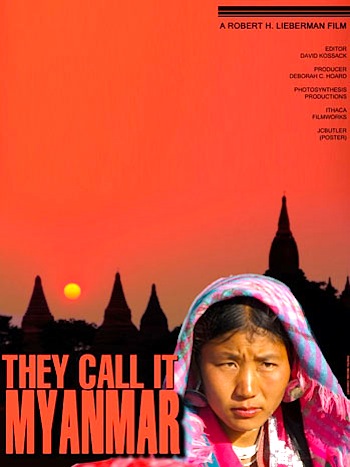By Joe Bendel. Even the Buddhist monks are fed up with Burma’s oppressive military regime. A deeply devout nation, the Burmese people were shocked when the army fired on their peaceful demonstrations. Yet, the junta still rules. Physics professor, novelist, and independent filmmaker Robert H. Lieberman explores the tragic dynamics of the Southeast Asian country from a layman’s point of view in They Call It Myanmar: Lifting the Curtain, which screens for two nights only this coming Monday and Tuesday in New York.
Perhaps because of the wide variety of professional hats Lieberman wears, he was recruited to participate in a State Department sponsored filmmaker mentoring program. Having gained entrée into the “second most isolated country on the planet,” Lieberman recognized what an unusual opportunity he had. Over the next two years, Lieberman furtively filmed the people and their customs, keeping his eyes peeled for anything that might shed light on the nation’s political and social realities. He even scored an on-camera sit-down interview with the recently released Aung San Suu Kyi.
 Culled from hours of footage, Call mixes sort of National Geographic-style appreciations of Burma/Myanmar’s stunning temples and their distinctive application of thanaka facial paste for cooling and cosmetic purposes via handheld camcorder, with legitimate muckraking. Indeed, at not insignificant personal risk, Lieberman conveys a real sense of the fear and paranoia fostered by the military police state. Yet, perhaps even more shocking are the truly Sisyphean hand-to-mouth living conditions endured by the overwhelming majority of Burmese, vividly documented in Call.
Culled from hours of footage, Call mixes sort of National Geographic-style appreciations of Burma/Myanmar’s stunning temples and their distinctive application of thanaka facial paste for cooling and cosmetic purposes via handheld camcorder, with legitimate muckraking. Indeed, at not insignificant personal risk, Lieberman conveys a real sense of the fear and paranoia fostered by the military police state. Yet, perhaps even more shocking are the truly Sisyphean hand-to-mouth living conditions endured by the overwhelming majority of Burmese, vividly documented in Call.
For obvious reasons, Lieberman scrupulously maintains the anonymity of his interview subjects. Their commentary is consistently illuminating and more often than not depressing, suggesting the regime’s pervasive oppression has even affected the populace’s psychological ability to think as political free agents. Still, for true profundity, it is hard to top Suu Kyi’s parting words: “politicians who think they’ve gone beyond being politicians are very dangerous.” Someone should carve that in marble where the current and future occupants of the Oval Office will see it every day.
There is nothing more frustrating than an ostensibly independent filmmaker producing a puff piece in a notorious closed society (as was the case with Justine Shapiro’s whitewashed Our Summer in Tehran, for instance). To his credit, Lieberman chose to take the tougher path. The result is a solid, boots-on-the-ground overview of contemporary Burma, periodically spiked with moments of shocking outrage. Interested viewers who find it a good general introduction can then fill in the details with more specific case studies, like HBO2’s Burma Soldier and Luc Besson’s upcoming Suu Kyi biopic The Lady. Recommended for general audiences, They Call It Myanmar screens Monday and Tuesday (2/27 & 2/28) at New York’s Landmark Sunshine, with similar two-evening Landmark engagements to follow in Philadelphia, DC, and Boston.
GRADE: B
Posted on February 24th, 2012 at 3:29pm.